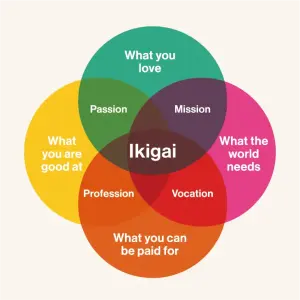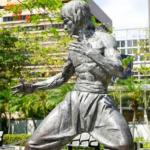 I love the Japanese concept of Ikigai. You may have come across in this popular figure from Héctor Garcia and Francesco Miralles’ book Ikigai: The Japanese Secret to a Long and Happy Life. They give a nice definition of Ikigai being the “happiness of always being busy” which is “like logotherapy, but it goes a step beyond.”
I love the Japanese concept of Ikigai. You may have come across in this popular figure from Héctor Garcia and Francesco Miralles’ book Ikigai: The Japanese Secret to a Long and Happy Life. They give a nice definition of Ikigai being the “happiness of always being busy” which is “like logotherapy, but it goes a step beyond.”
It’s the place where purpose, meaning, and motivation are harmonized – a coherence of mind, body, and spirit – a flow state where one’s passion, mission, vocation, and profession are in optimal alignment.
Logotherapy became famous from Victor Frankl’s Man’s Search for Meaning, which is a now a mainstream psychotherapy often implemented within cognitive behavior therapy. It continues to prove out it’s hypothesis that we need “not a tensionless state but rather the struggling and striving for a worthwhile goal, a freely chosen task”, which is “the call of a potential meaning waiting to be fulfilled by him.”
To continue with Frankl:
“By declaring man is responsible and must actualize the potential meaning of his life, I wish to stress that the true meaning of life is to be discovered in the world rather than within man or his own psyche, as though it were a closed system. I have termed this constitutive characteristic ‘the self transcendence of human existence.’ It denotes the fact that being human always points, and is directed, to something, or someone, other than oneself-be it a meaning to fulfill or another human being to encounter. The more one forgets himself – by giving himself to a cause to serve or another person to love-the more human he is and the more he actualizes himself.”
Ikigai and logotherapy have a key underlying theme found in Aristotle and many other Western and Eastern philosophies: we cannot help that we are both social and rational animals. Ignoring our passions, relationships, and interconnectedness is to ignore our humanity and invite despair. By way of example, if one hates law, but choose it as a profession to simply maximize their earnings (and shut out hobbies, their family, exercise, volunteering, etc.), they are far from finding true meaning in their lives. But if this same person always had a passion for building things, perhaps they don’t ignore this calling, and they become a civil engineer. Whether or not they make as much money as an attorney is irrelevant if they feel their life has meaning. Marc Twain’s famous quote comes to mind: “find a job you enjoy doing, and you will never have to work a day in your life.”
But Ikigai adds the key nuance of completeness and coherence. We need meaning in all main areas of our lives – at least to be in the center mark of one’s potential Ikigai. Without this completeness and coherence, we’ve not yet arrived at Ikigai. One can find meaning one area (or maybe more) but if their marriage and family life is in shambles (and that was missional to this person), then they’re off the mark. Or perhaps you’re a passionate singer or artist but completely broke and get a dead end job just to pay the bills – also not quite Ikigai. But if you also loved kids and started down the road of teaching – perhaps the later version of yourself teaching high school and community college by day – and your own personal song/artistic expressions on the evenings/weekends – you are now much closer to the center.
The truth of this concept is undeniable, at least from my personal experience. Without question, the further I have been from the center, the worse I’ve been in life. Conversely, the “flow states” that I’ve felt of mind, body, spirit – all have been when these key areas of my life are full and cohering. It’s unsurprising that science is continuing to bear this out as well in psychological studies – better Ikigai positively predicting well-being and negatively predicting depression – across genders and cultures.
Back Mark Twain’s quote, to take things a bit further, find meaning in all key areas of your life – what you are good at, what the world needs, what you love, and what you can be paid for – and find the place where they are one in the same. The center of that place is Ikigai.













